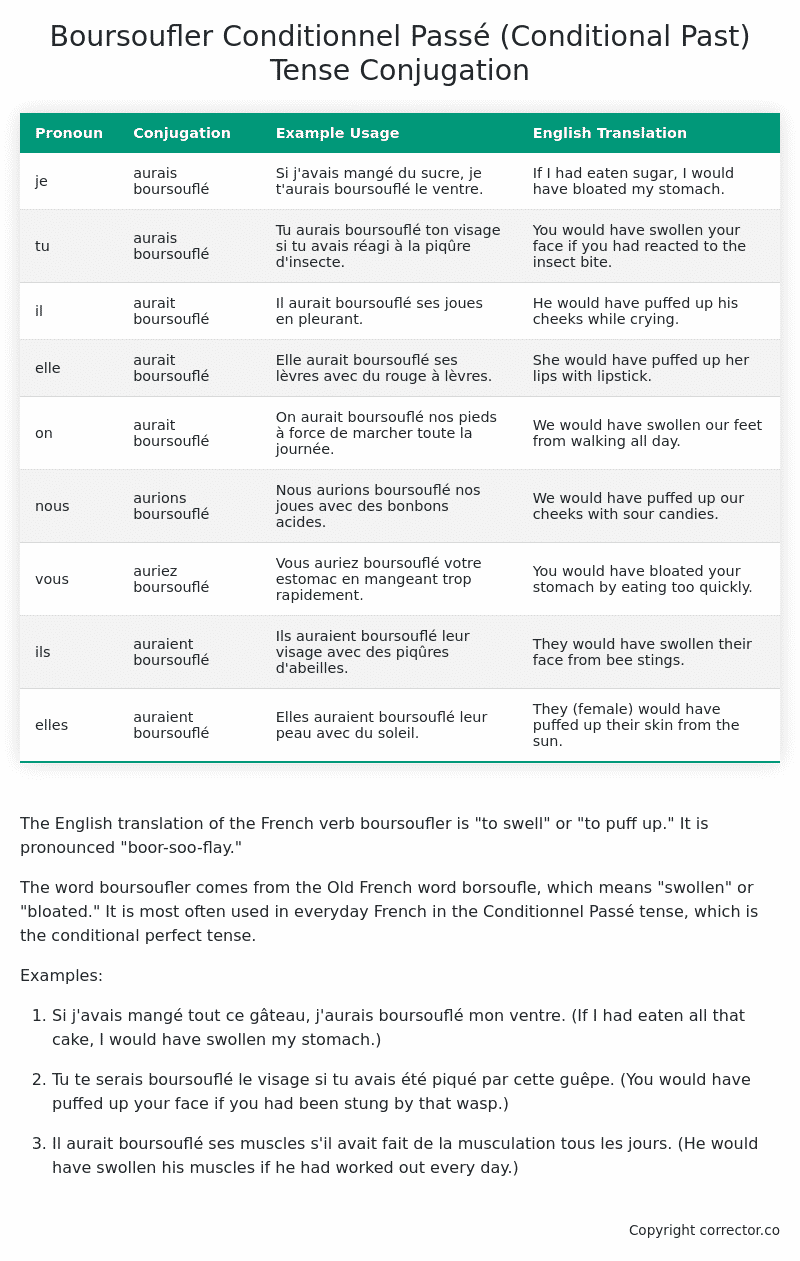Conditionnel Passé (Conditional Past) Tense Conjugation of the French Verb boursoufler
Introduction to the verb boursoufler
The English translation of the French verb boursoufler is “to swell” or “to puff up.” It is pronounced “boor-soo-flay.”
The word boursoufler comes from the Old French word borsoufle, which means “swollen” or “bloated.” It is most often used in everyday French in the Conditionnel Passé tense, which is the conditional perfect tense.
Examples:
-
Si j’avais mangé tout ce gâteau, j’aurais boursouflé mon ventre. (If I had eaten all that cake, I would have swollen my stomach.)
-
Tu te serais boursouflé le visage si tu avais été piqué par cette guêpe. (You would have puffed up your face if you had been stung by that wasp.)
-
Il aurait boursouflé ses muscles s’il avait fait de la musculation tous les jours. (He would have swollen his muscles if he had worked out every day.)
Table of the Conditionnel Passé (Conditional Past) Tense Conjugation of boursoufler
| Pronoun | Conjugation | Example Usage | English Translation |
|---|---|---|---|
| je | aurais boursouflé | Si j’avais mangé du sucre, je t’aurais boursouflé le ventre. | If I had eaten sugar, I would have bloated my stomach. |
| tu | aurais boursouflé | Tu aurais boursouflé ton visage si tu avais réagi à la piqûre d’insecte. | You would have swollen your face if you had reacted to the insect bite. |
| il | aurait boursouflé | Il aurait boursouflé ses joues en pleurant. | He would have puffed up his cheeks while crying. |
| elle | aurait boursouflé | Elle aurait boursouflé ses lèvres avec du rouge à lèvres. | She would have puffed up her lips with lipstick. |
| on | aurait boursouflé | On aurait boursouflé nos pieds à force de marcher toute la journée. | We would have swollen our feet from walking all day. |
| nous | aurions boursouflé | Nous aurions boursouflé nos joues avec des bonbons acides. | We would have puffed up our cheeks with sour candies. |
| vous | auriez boursouflé | Vous auriez boursouflé votre estomac en mangeant trop rapidement. | You would have bloated your stomach by eating too quickly. |
| ils | auraient boursouflé | Ils auraient boursouflé leur visage avec des piqûres d’abeilles. | They would have swollen their face from bee stings. |
| elles | auraient boursouflé | Elles auraient boursouflé leur peau avec du soleil. | They (female) would have puffed up their skin from the sun. |
Other Conjugations for Boursoufler.
Le Present (Present Tense) Conjugation of the French Verb boursoufler
Imparfait (Imperfect) Tense Conjugation of the French Verb boursoufler
Passé Simple (Simple Past) Tense Conjugation of the French Verb boursoufler
Passé Composé (Present Perfect) Tense Conjugation of the French Verb boursoufler
Futur Simple (Simple Future) Tense Conjugation of the French Verb boursoufler
Futur Proche (Near Future) Tense Conjugation of the French Verb boursoufler
Plus-que-parfait (Pluperfect) Tense Conjugation of the French Verb boursoufler
Passé Antérieur (Past Anterior) Tense Conjugation of the French Verb boursoufler
Futur Antérieur (Future Anterior) Tense Conjugation of the French Verb boursoufler
Subjonctif Présent (Subjunctive Present) Tense Conjugation of the French Verb boursoufler
Subjonctif Passé (Subjunctive Past) Tense Conjugation of the French Verb boursoufler
Subjonctif Imparfait (Subjunctive Imperfect) Tense Conjugation of the French Verb boursoufler
Conditionnel Présent (Conditional Present) Tense Conjugation of the French Verb boursoufler
Conditionnel Passé (Conditional Past) Tense Conjugation of the French Verb boursoufler (this article)
L’impératif Présent (Imperative Present) Tense Conjugation of the French Verb boursoufler
L’infinitif Présent (Infinitive Present) Tense Conjugation of the French Verb boursoufler
Struggling with French verbs or the language in general? Why not use our free French Grammar Checker – no registration required!
Get a FREE Download Study Sheet of this Conjugation 🔥
Simply right click the image below, click “save image” and get your free reference for the boursoufler Conditionnel Passé tense conjugation!

Boursoufler – About the French Conditionnel Passé (Conditional Past) Tense
Formation
Common Everyday Usage Patterns
Expressing Unreal Past Scenarios
Polite Requests or Suggestions
Expressing Doubt or Uncertainty
Interactions with Other Tenses
Conditional Present
Indicative Past Tenses
Conditional Future
Summary
Want More?
I hope you enjoyed this article on the verb boursoufler. Still in a learning mood? Check out another TOTALLY random French verb conjugation!


